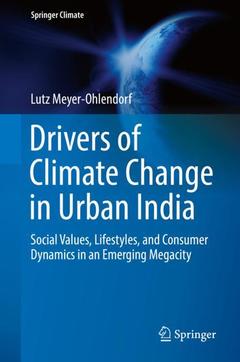Description
Drivers of Climate Change in Urban India, 1st ed. 2019
Social Values, Lifestyles, and Consumer Dynamics in an Emerging Megacity
Springer Climate Series
Language: English
Subjects for Drivers of Climate Change in Urban India:
Publication date: 12-2018
271 p. · 15.5x23.5 cm · Hardback
271 p. · 15.5x23.5 cm · Hardback
Description
/li>Contents
/li>Biography
/li>Comment
/li>
This study transcends the homogenizing (inter-)national level of argumentation (?rich? versus ?poor? countries), and instead looks at a sub-national level in two respects: (1) geographically it focuses on the rapidly growing megacity of Hyderabad; (2) in socio-economic terms the urban population is disaggregated by taking a lifestyle typology approach. For the first time, the lifestyle concept ? traditionally being used in affluent consumer societies ? is applied to a dynamically transforming and socially heterogeneous urban society. Methodically, the author includes India-specific value orientations as well as social practices as markers of social structural differentiation. The study identifies differentials of lifestyle-induced GHG emissions (carbon footprints) and underlines the ambiguity of a purely income based differentiation with regard to the levels of contribution to the climate problem.
Chapter1. Introduction: Climate change and lifestyle – the relevance of new concepts for socialecological research.- Chapter2. Approaches of measuring human impacts on climate change.- Chapter3. The research context: India and the megacity of Hyderabad.- Chapter4. Conceptualisation and operationalisation – A social geography of climate change: Social-cultural mentalities, lifestyle, and related GHG emission effects in Indian cities.- Chapter5. Results part I – Descriptive analysis of manifest variables and preparation of latent components for the lifestyle analysis.- Chapter6. Results part II – Income, practice, and lifestyle-oriented analysis of personal-level GHG emissions.- Chapter7. Discussion.- Chapter8. Final conclusions – Understanding inequalities in consumption-based, personal level GHG emissions.
Dr. Lutz Meyer-Ohlendorf is a social geographer at Potsdam Institute for Climate Impact Research (PIK) in Germany.
Presents the first lifestyle typology in the Indian context
Provides a lifestyle-specific analysis of individual level carbon footprints applied to the Global South
Offers a new methodology on segmenting lifestyles based on Indian specific value orientations and social practices
Comprehensively analyzes a representative survey on personal level carbon footprints in urban India
© 2024 LAVOISIER S.A.S.




